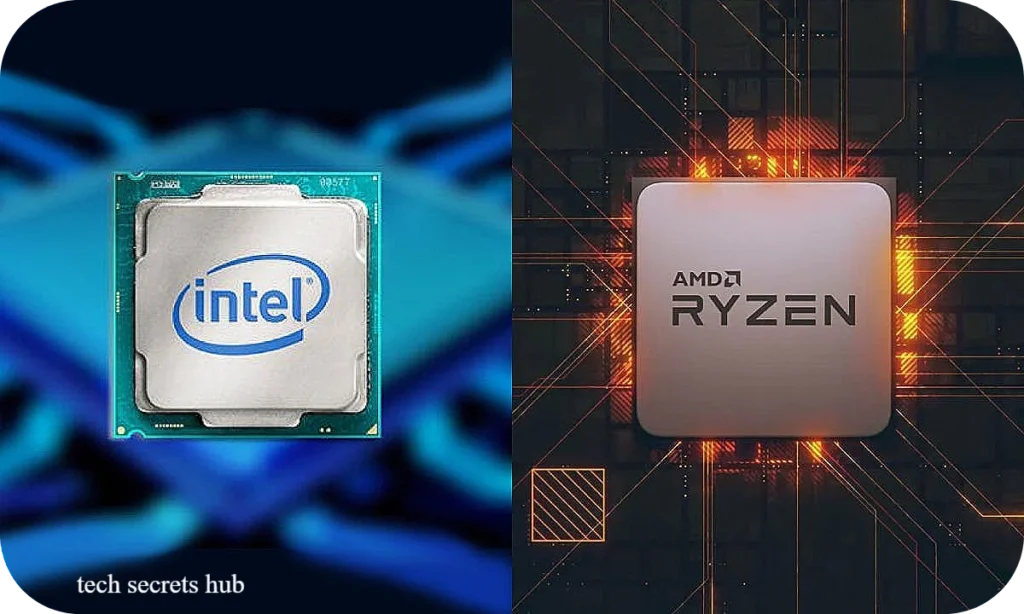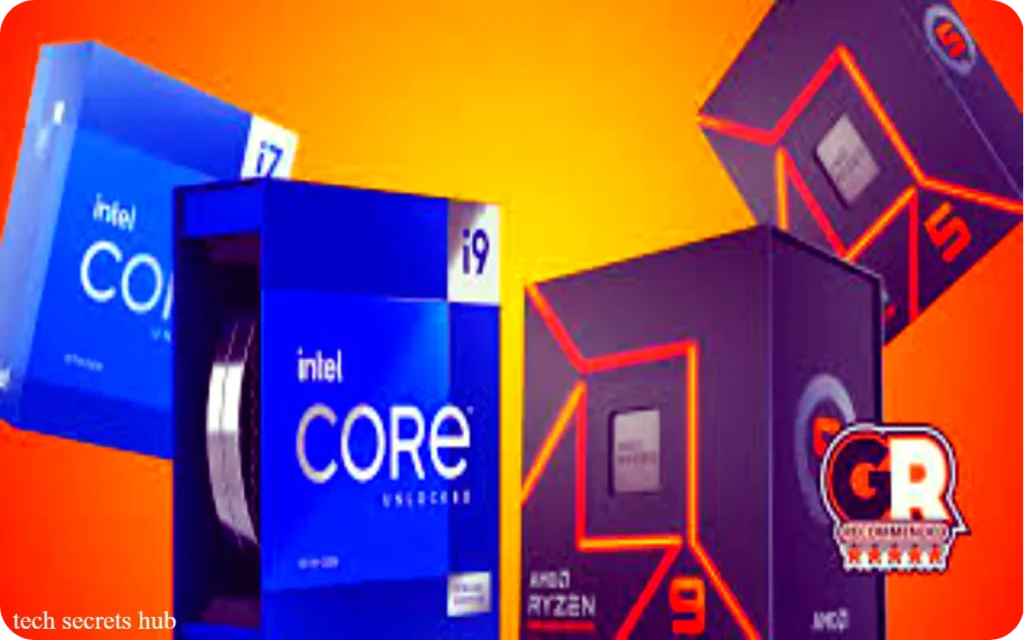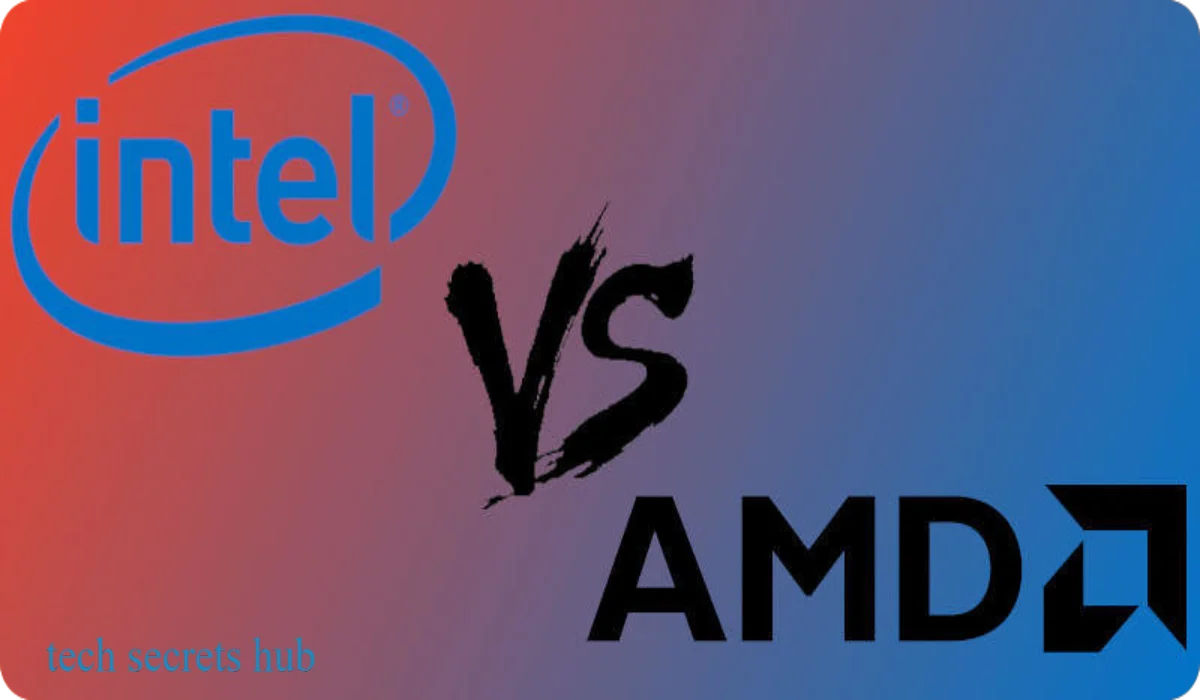Every time I sit at my computer, I remember the day I made the crucial decision between AMD vs Intel for its heart—the central processing unit. It was a moment filled with both excitement and uncertainty as I held that small silicon chip, ready to install it into my motherboard. This choice between AMD vs Intel plays a significant role in shaping our digital lives.
Choosing the right CPU is more critical than ever in our digital world. Articles comparing AMD and Intel are everywhere, but we dive deeper. We’re not just asking which is better. We want to know what makes each one tick and which fits your tech needs best. With AMD’s Ryzen 9 7950X3D having 16 cores and Intel’s Core i9-13900KS with 24 cores, your choice affects your productivity and fun.

- AMD’s Ryzen 9 7950X3D and Intel’s Core i9-13900KS are top choices for gaming and multitasking.
- Intel is best for single-thread tasks, like gaming, while AMD is great for overclocking.
- AMD’s Ryzen 7 7800X3D stands out with its 3D V-Cache for fantastic gaming.
- Intel and AMD now offer competitive prices, thanks to Intel’s Raptor Lake and AMD’s non-X models.
- AMD’s AM5 support means your system can grow with new tech.
- In content creation, Intel CPUs with many cores beat AMD in some tasks.
- Neither AMD nor Intel wins in all games; different chips shine in various situations
Understanding CPU Fundamentals
Before we look at AMD and Intel CPUs, let’s understand how CPUs work. We’ll focus on key parts like the CPU core, threads, and CPU cache. These are crucial for knowing how a processor handles different tasks.
What is a CPU Core?
A CPU core is the main part of a processor that does the work. It can handle its own tasks, making modern processors with multiple cores great for multitasking. For example, the AMD Ryzen 5 5600 with 6 cores makes handling many tasks at once much easier.
The Role of Threads in CPU Performance
Threads are like virtual helpers that split a CPU core’s power to do more tasks simultaneously. Intel calls this hyper-threading, while AMD calls it simultaneous multithreading (SMT). More threads mean you can do more things faster, especially with processors that have a lot of them
Deciphering CPU Cache and Its Impact on Computing
CPU cache is a fast, small memory that stores data for quick access. It’s critical for fast CPU performance by cutting down on data access time. The faster levels like L1, L2, and L3 cache make a big difference in speed, making tasks quicker.
Knowing these parts helps us understand how CPUs work and their impact on our computers. This knowledge is critical to comparing CPUs from AMD and Intel later on.
AMD vs Intel Processor Architecture
Exploring processor architecture shows significant differences and unique benefits between AMD Ryzen and Intel processors. Each brand designs its tech for different needs, like gaming or multitasking. Let’s look into these technologies that are changing computing.
AMD Ryzen Series: Cutting-edge Games and Productivity
The AMD Ryzen series has changed the game regarding gaming and productivity. Models like the Ryzen 9 7950X3D ensure great multitasking and gaming. They’re known for many cores and cache, making fast data processing and computers more responsive.
The Ryzen 9 7950X3D has 16 cores and 32 threads, reaching 5.7GHz. It’s not just about power; it’s efficient, balancing performance with low power use. This is great for everyday tasks and heavy computing.
Intel’s Hybrid Architecture: Efficiency Meets High Performance
high-power cores with efficient ones for versatile performance. This makes Intel processors great for many tasks, from simple web use to creating content.
The i9-14900K has 24 cores (8 high-performance and 16 efficient) and supports 32 threads. Intel aims for top performance per core, which is suitable for fast tasks and a smooth user experience. This is key for tasks needing quick data processing and low latency.
In conclusion, AMD Ryzen and Intel processors show the power of choice in modern computing. Whether you need multitasking or single-thread efficiency, you have a solution. As technology grows, so will our digital interactions.
The Impact of Benchmarks on CPU Performance
Looking at AMD vs Intel benchmarks helps us understand CPU performance better. These benchmarks show CPUs’ power and capability, especially in heavy tasks like gaming and professional work.
Recent studies provide a detailed look at the best CPUs for gaming. For example, the AMD Ryzen 9 7950X3D is excellent for gaming and work, costing $699. It has impressive architecture and performance. Intel’s Core i9-13900KS, also $699, is another top contender, one of the fastest desktop chips.
| CPU Model | Price | Use Case | Base/Boost GHz |
|---|---|---|---|
| Intel’s Core i9-13900KS | Exclusive at Micro Center | Budget gaming | Information Not Available |
| Ryzen 7 7800X3D | $449 | Fastest gaming chip | Information Not Available |
| Ryzen 9 7950X3D | $699 | High-end gaming and productivity | Information Not Available |
| Intel Core i9-13900KS | $699 | High-end desktop PC | Information Not Available |
| Intel Core i3-13100F | $110 | Solid gaming performance | Information Not Available |
For those on a budget, AMD and Intel offer great options. The AMD Ryzen 5 5600X3D is only at Micro Center and costs $110. It’s perfect for gamers who want good performance without spending a lot. The Intel Core i3-13100F is also $110 and offers solid gaming performance.
Tests and benchmarks show a close race between AMD and Intel. Ryzen often wins in performance for the price and scores high overall. This info is critical when picking a CPU that fits your needs and budget.
In conclusion, knowing the AMD vs Intel benchmarks is critical whether you’re building a gaming rig or a budget workstation. This helps you choose a CPU that meets your needs and offers excellent value and performance.
AMD vs Intel in the Gaming Arena
I’ve always been into the AMD vs Intel gaming debate, especially with each new CPU release. Both brands have their perks, whether you’re looking for a high-performance gaming CPU or something more budget-friendly.
High-Performance CPUs for Hardcore Gamers
CPUs like the AMD Ryzen 9 7950X3D and Intel Core i9-14900KF stand out for top-tier gaming. They have lots of cores and threads and big caches. These specs are vital for smoothly handling complex games.
The AMD Ryzen 9 7950X3D is excellent for games that use many threads, perfect for streamers or content creators. On the other hand, the Intel Core i9-14900KF is better for games that focus on single-threaded performance.

For mid-range and budget options, AMD and Intel have something for gamers on a budget but still want good performance. The Intel Core i7-14700K and Intel Core i7-14700Kare strong contenders in the mid-range market. They offer solid performance for most games without costing too much.
The AMD Ryzen 5 5700G and Intel Core i5-12600K are excellent choices for tight budgets. They’re more affordable but deliver reasonable frame rates for many games with a good graphics card.
Here’s a detailed look at some prevalent AMD and Intel CPUs for gaming:
| CPU Model | Core/Thread Count | Base/Boost Clock (GHz) | Cache Size (MB) | Integrated Graphics |
|---|---|---|---|---|
| AMD Ryzen 9 7950X3D | 16/32 | 4.2/5.7 | 144 | None |
| Intel Core i9-14900KF | 16/24 | 3.2/5.4 | 36 | None |
| AMD Ryzen 7 7700X | 8/16 | 4.5/5.4 | 40 | Radeon Graphics |
| Intel Core i7-14700K | 12/20 | 3.7/5.3 | 30 | UHD Graphics 770 |
| AMD Ryzen 5 5700G | 8/16 | 3.8/4.6 | 20 | Radeon Graphics |
| Intel Core i5-12600K | 10/16 | 3.7/4.9 | 20 | UHD Graphics 770 |
This table shows the differences and perks of each model. It helps gamers pick the right CPU for their needs.
Creating Content with AMD and Intel CPUs
Choosing the right CPU is critical for digital creators. It affects how well they can make multimedia content. When looking at content creation CPUs, the choice often comes down to AMD vs Intel multimedia editing skills. Also, comparative CPU costs are essential for finding the best value, especially for mid-range processors.
AMD and Intel have made CPUs for heavy tasks and multitasking. But slight differences matter greatly depending on what you need and how much you can spend.
High Thread Count and CPU Multitasking Capabilities
AMD’s Ryzen and Intel’s Core i9 and i7 lines are excellent for multitasking and heavy tasks. For example, AMD Ryzen has more cores and threads than Intel, making it better for tasks requiring lots of processing. This makes AMD a top pick for functions that use many cores.
Comparative Cost of Mid-Level Performance CPUs
Looking at comparative CPU costs, AMD is often the more affordable choice without losing much performance. However, Intel CPUs are better for tasks needing high single-core speed, like gaming and simple content use.
Let’s look at some numbers:
| Feature | Intel i7-14700K | AMD Ryzen 7 (Average) |
|---|---|---|
| Cores/Threads | 12/28 | 8/16 |
| Boost Frequency | Up to 4.9GHz | Up to 4.4GHz |
| Integrated Graphics | Iris Xe | Radeon Graphics |
| TDP | Higher | Lower |
| Performance in Adobe Photoshop | 10% higher than AMD 7950X/7900X | Slightly lower |
| Cost | Higher | More cost-effective |
The Intel i7-14700K is better in Adobe Photoshop than AMD rivals, making it great for graphic design.
Ultimately, whether you choose AMD or Intel depends on your specific needs and how you work. Consider comparative CPU costs to ensure you get the right balance of performance and budget.
CPU Options for Everyday Office and Home Use.
An illustration of a desktop computer with two different CPU options – one by AMD and the other by Intel. Each CPU should be highlighted with its respective brand colour to indicate the choice for home use. The setting should be a neutral background with simple items showcasing everyday home or office use, such as a pen, notebook, coffee mug, and plant. The overall style should be modern and sleek.
Cost-Efficient CPUs for Standard Computing Needs
There are great CPUs out there for those needing reliable performance without high-end features. The Intel Core i5-10400 and AMD Ryzen 5 7600 stand out. The Intel model is affordable and handles everyday tasks well, making it perfect for standard use CPU. AMD’s option is known for its value, offering excellent performance at a lower cost.
Examining Power Efficiency in Budget CPUs
Energy efficiency is critical for users who keep their systems on all day. AMD is known for making CPUs that use less power, which means they run cooler and last longer. Budget CPUs for home use are affordable and still focus on being energy-efficient. The AMD Ryzen 5 5600 and the Intel Core i3 13100F are great examples, offering good performance without high energy use.
| Model | Price | Savings |
|---|---|---|
| AMD Ryzen 5 7600 | $182.16 | $46.84 |
| Intel Core i3 13100F | $176.88 | $64.37 |
| AMD Ryzen 5 5600 | $162.99 | $156.01 |
| Intel Core i5 10400 | $126.79 | $55.21 |
Focusing on Laptop CPUs: Mobility Meets Power
Choosing between AMD vs Intel laptops is all about performance, power, and price. Today, people want to work smoothly in a cafe or at home. So, knowing about laptop CPU performance is critical.
Popular Laptop Processors by AMD and Intel
Top CPUs like the AMD Ryzen 9 7945HX3D and Intel Core i9-13900HX give laptops desktop power. They’re perfect for those needing lots of energy on the move. The AMD Ryzen 7 5825U and Intel Core i7-11370H are great for everyday tasks. They balance power with portability, which is great for work, some gaming, and making media.
Laptop CPU Performance and Price Considerations
Choosing between AMD and Intel means looking at power use, graphics, and cost. AMD is known for its multi-core solid performance and lower prices. Intel shines in single-core speed and saving power.
Choosing the proper laptop CPU performance can change how you use your laptop and its battery life. Here’s a look at power use and performance:
| Feature | AMD | Intel |
|---|---|---|
| Integrated Graphics | Vega graphics (entry-level gaming & multimedia) | Often relies on separate GPU |
| Power Efficiency (idle) | Varies by model and usage | 2.3-2.8W (i3-13100 desktop variant) |
| Price Range | Generally more budget-friendly | Tends to be higher |
| Advanced Connectivity | Quick adoption of PCIe 4.0 and 5.0 | Standard adoption |
Choosing between AMD vs Intel laptops depends on what you need. Think about how you’ll use it, how long the battery should last, and what you can afford. This will help you pick the right processor for your mobile computing.
Price Breakdown: AMD vs Intel
Looking at the cost comparison between AMD and Intel CPUs, it’s vital to explore pricing across different models. AMD has often been the go-to for those wanting value, offering more cores for less money. Intel, however, has been known for top-notch performance per core but at a higher cost. Our views on AMD vs Intel pricing must adapt as the market changes. The current showdown between Intel’s Raptor Lake and AMD’s Ryzen 7000 series shows a tight race in the CPU investment field.
In 1968, Intel became a giant in the field, known for single-core speed, which is crucial for some tasks. AMD, founded in 1969, thrives with Ryzen CPUs, praised for multi-core strength, ideal for functions needing parallel processing. When looking at models like the Intel Core i9-14900K and the AMD Ryzen 9 7950X3D, both great for gaming, the choice depends on their unique benefits and how they fit with other system parts, not just cost.
The mid-range Ryzen 7 7700X from AMD and Intel’s Core i5-13600K show how both brands aim to offer good value. At the high end, comparing the AMD Ryzen 9 7950X3D and Intel Core i9-14900KF, the choice goes beyond price—it’s about the future of personal computing. Whether it’s PCIe 5.0 and DDR5 support that favours AMD or Intel’s energy efficiency, I advise considering the initial AMD vs Intel price, long-term value, and how it meets your computing needs.
FAQ
AMD vs Intel: Which CPU is Right for You?
Choosing between AMD and Intel CPUs depends on your needs. Think about gaming, multitasking, everyday use, and your budget. AMD offers more cores and energy efficiency. Intel is known for high clock speeds and per-core performance.
What is a CPU Core?
A CPU core is the main part of a processor that runs instructions. Modern CPUs have many cores. This lets them do many tasks at once, making your computer work faster.
The Role of Threads in CPU Performance
Threads let a single core work on several tasks at once. This makes your system more efficient, especially when you’re doing many things at once. More threads mean better handling of tasks together.
Deciphering CPU Cache and Its Impact on Computing
CPU cache is a fast memory inside the CPU that stores data you use a lot. It makes your computer faster. The size and speed of the cache affect performance, especially in demanding tasks.
AMD Ryzen Series: Cutting-edge Games and Productivity
AMD Ryzen processors are great for gaming and productivity. They have many cores and threads, big caches, and are good at multitasking.
Intel’s Hybrid Architecture: Efficiency Meets High Performance
Intel uses a hybrid architecture with fast and efficient cores. This design gives great performance and saves power. It’s perfect for laptops where battery life matters.
The Impact of Benchmarks on CPU Performance
Benchmarks help compare AMD and Intel CPUs under different loads. They show things like core counts, cache sizes, and speeds. This helps you pick the best CPU for your needs, like gaming or heavy tasks.
High-Performance CPUs for Hardcore Gamers
For serious gamers, CPUs like the AMD Ryzen 9 7950X3D and Intel Core i9-14900KF are top choices. They have lots of cores, threads, and cache for the best gaming.
Mid-Range and Budget Gaming CPU Comparisons
For mid-range and budget gaming, look at CPUs like the AMD Ryzen 7 7700X and Intel Core i5-13600K. They offer good performance without the high cost of top-tier gaming CPUs.
High Thread Count and CPU Multitasking Capabilities
High thread counts help creators multitask smoothly and efficiently. CPUs like Intel’s Core i9-13900K and AMD’s Ryzen 7950X are great for tasks like video editing.
Comparative Cost of Mid-Level Performance CPUs
Mid-level CPUs from AMD and Intel have different prices but similar performance. Options like Intel’s i7-13700K and AMD’s Ryzen 7700X are good for content creation and everyday tasks.
Cost-Efficient CPUs for Standard Computing Needs
For everyday tasks, CPUs like the AMD Ryzen 5 5600 and Intel Core i3 13100F are affordable and powerful. They’re perfect for users who don’t need high-end gaming or content creation features.
Examining Power Efficiency in Budget CPUs
AMD is known for efficient processors that use less power and run cooler. Both AMD and Intel offer budget CPUs that balance performance and power use.
Popular Laptop Processors by AMD and Intel
Top laptop processors include the AMD Ryzen 9 7945HX3D and Intel Core i9-13900HX for high performance. For everyday tasks, the AMD Ryzen 7 5825U and Intel Core i7-11370H are good choices.
Laptop CPU Performance and Price Considerations
When picking a laptop CPU, consider your budget and the laptop’s features. AMD and Intel offer processors at various price points, balancing cost with power and efficiency.
Price Breakdown: AMD vs Intel
AMD and Intel CPUs have different prices across segments. AMD is often cheaper with more cores for the price. Intel CPUs usually cost more but have higher clock speeds. Prices change with market competition and new technology.
Purchase link
AMD Ryzen 7 7800X3D BUY THIS ON AMAZON
AMD Ryzen 5 5600X BUY THIS ON AMAZON
AMD Ryzen 5 5700G BUY THIS ON AMAZON
AMD Ryzen 5 7600X BUY THIS ON AMAZON
Intel Core i5-12600K BUY THIS ON AMAZON
Intel Core i9-13900K BUY THIS ON AMAZON
Intel Core i7-14700K BUY THIS ON AMAZON
Intel Core i5 12400F BUY THIS ON AMAZON




